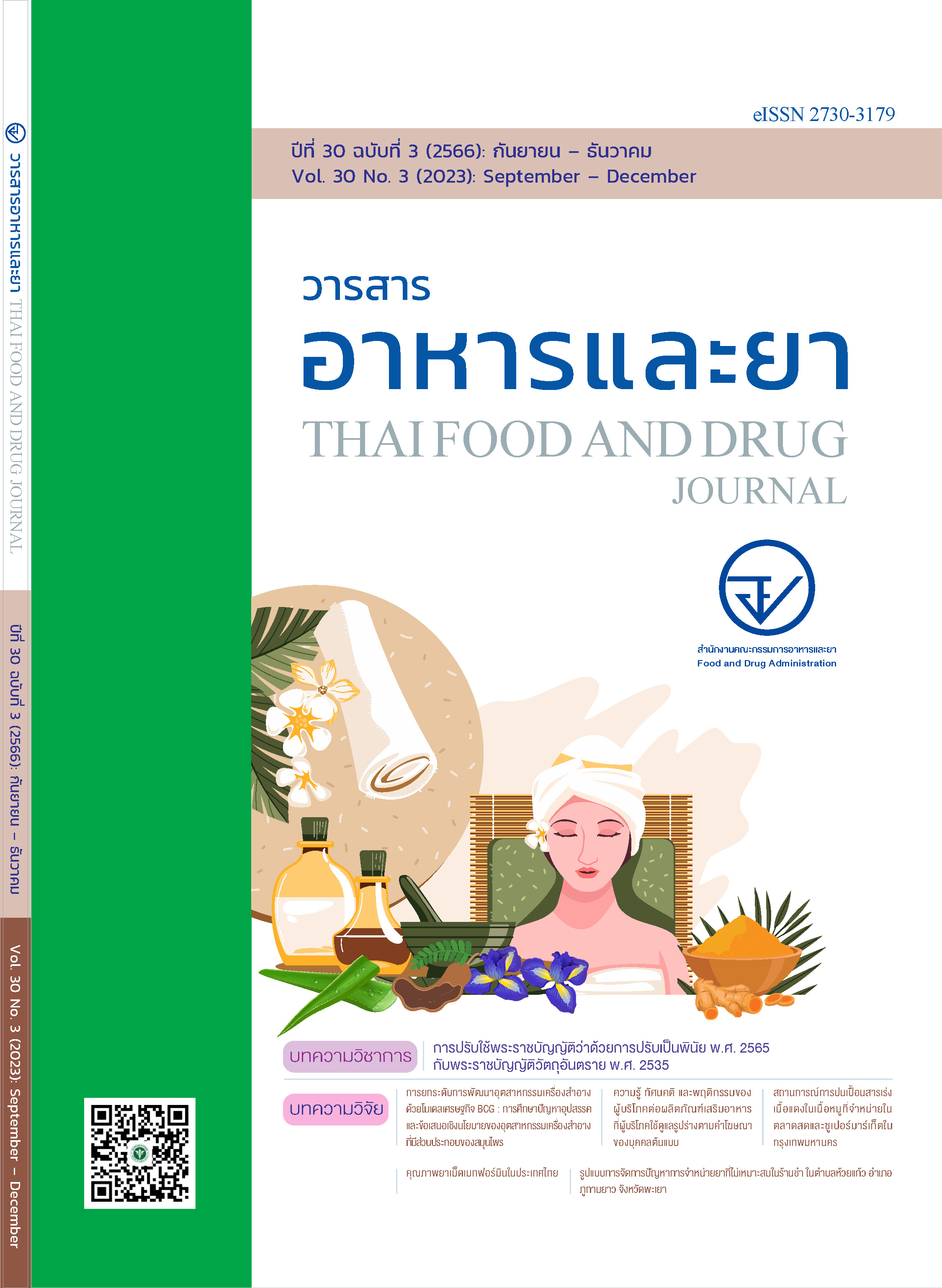ความรู้ ทัศนคติ และพฤติกรรมของผู้บริโภคต่อผลิตภัณฑ์เสริมอาหารที่ผู้บริโภคใช้ดูแลรูปร่างตามคำโฆษณาของบุคคลต้นแบบ
Main Article Content
บทคัดย่อ
ความสำคัญ: ผลิตภัณฑ์เสริมอาหารเป็นหนึ่งในตัวเลือกที่ได้รับความนิยมจากผู้ที่ต้องการดูแลรูปร่าง การโฆษณาโดยบุคคลต้นแบบเป็นส่วนหนึ่งของการเพิ่มยอดการใช้ผลิตภัณฑ์ ที่ผ่านมาพบว่ามีผลิตภัณฑ์จำนวนมากที่ไม่ถูกต้องตามกฎหมาย เช่น ลักลอบใส่ยาหรือสารที่เป็นอันตราย รวมถึงการโฆษณาที่ไม่เป็นไปตามกฎหมายและข้อเท็จจริงทางวิชาการ เช่น กล่าวอ้างถึงสรรพคุณในการลดน้ำหนักหรือการรักษาโรค ซึ่งเป็นข้อมูลที่ทำให้ผู้บริโภคเข้าใจผิดมาโดยตลอด แสดงถึงความเสี่ยงที่อาจเกิดขึ้นกับผู้บริโภคจากการบริโภคผลิตภัณฑ์เสริมอาหารที่ไม่ปลอดภัย
วัตถุประสงค์: เพื่อสำรวจระดับความรู้ ทัศนคติ และพฤติกรรมของผู้บริโภคที่เคยเห็นการโฆษณาโดยใช้บุคคลต้นแบบต่อผลิตภัณฑ์เสริมอาหารเพื่อการดูแลรูปร่าง ศึกษาความสัมพันธ์ระหว่างความรู้และทัศนคติกับพฤติกรรมการบริโภคผลิตภัณฑ์เสริมอาหารเพื่อการดูแลรูปร่าง และเปรียบเทียบทัศนคติของผู้บริโภคต่อผลิตภัณฑ์เสริมอาหารเพื่อการดูแลรูปร่างที่มีการโฆษณาโดยใช้บุคคลต้นแบบ
วิธีการศึกษา: เป็นการศึกษาเชิงปริมาณระหว่างเดือนเมษายนถึงตุลาคม 2564 เก็บข้อมูลโดยใช้แบบสอบถามออนไลน์โดยสุ่มตัวอย่างแบบบังเอิญจากผู้บริโภคจำนวน 400 คนที่มีอายุ 20 ปีขึ้นไป เคยบริโภคผลิตภัณฑ์เสริมอาหารเพื่อการดูแลรูปร่างในช่วง 3 เดือนที่ผ่านมา และเคยพบเห็นการโฆษณาผลิตภัณฑ์เสริมอาหารเพื่อการดูแลรูปร่างโดยใช้บุคคลต้นแบบ ใช้ rating scale 5 ระดับในการวัดทัศนคติและพฤติกรรม และหาค่าสัมประสิทธิ์สหสัมพันธ์เพียร์สัน วัดความแปรปรวนทางเดียว และเปรียบเทียบเป็นรายคู่ด้วยวิธีของ Scheffe’s หากพบความแตกต่างระหว่างตัวแปร
ผลการศึกษา: ผู้บริโภคส่วนใหญ่เป็นเพศหญิง มีอายุอยู่ในช่วง 20-29 ปี ดัชนีมวลกาย (BMI) อยู่ในเกณฑ์ปกติ แต่คิดว่าตนเองท้วมและไม่พอใจในรูปร่างของตนเอง ส่วนใหญ่รับรู้การโฆษณาผลิตภัณฑ์เสริมอาหารเพื่อการดูแลรูปร่างจากอินเทอร์เน็ต โดยมีบุคคลมีชื่อเสียงเป็นบุคคลต้นแบบในโฆษณา ผลสำรวจความรู้เกี่ยวกับผลิตภัณฑ์เสริมอาหารที่คาดหวังเพื่อการดูแลรูปร่าง พบว่า ส่วนใหญ่อยู่ในระดับต่ำ ร้อยละ 39.3 เมื่อจำแนกรายข้อพบมีความรู้สูงสุดในหัวข้อการแสดงเครื่องหมาย อย. ในฉลากของผลิตภัณฑ์เสริมอาหาร ร้อยละ 92.0 และต่ำสุดในหัวข้อความปลอดภัยในการบริโภคผลิตภัณฑ์เสริมอาหาร ร้อยละ 30.3 ด้านทัศนคติเกี่ยวกับผลิตภัณฑ์เสริมอาหารเพื่อการดูแลรูปร่าง พบว่า ทัศนคติภาพรวมอยู่ในระดับดีโดยมีค่าเฉลี่ยที่ 3.62 จากคะแนนเต็ม 5 ทัศนคติตามคุณลักษณะของบุคคลต้นแบบทั้ง 5 ด้าน ได้แก่ ความไว้วางใจ ความชำนาญเชี่ยวชาญ ความดึงดูดใจ ความเคารพ และความเหมือนมีค่าเฉลี่ย 3.58, 3.72, 3.70, 3.60 และ 3.50 ตามลำดับ ด้านพฤติกรรมการบริโภคผลิตภัณฑ์เสริมอาหารที่คาดหวังเพื่อการดูแลรูปร่าง พบว่า อยู่ในระดับปานกลางโดยมีค่าเฉลี่ยที่ 3.46 จากคะแนนเต็ม 5 โดยพฤติกรรมที่เหมาะสมมากที่สุดคือ อ่านข้อมูลบนฉลากอย่างละเอียดทุกครั้งและศึกษาข้อมูลความปลอดภัยของผลิตภัณฑ์ก่อนซื้อ ซึ่งมีค่าเฉลี่ย 3.86 และ 3.87 ตามลำดับ พฤติกรรมที่เหมาะสมน้อยที่สุด 3 อันดับ ได้แก่ ปรึกษาแพทย์หรือเภสัชกรก่อนใช้ ซื้อผลิตภัณฑ์จากอินเทอร์เน็ต และรับประทานผลิตภัณฑ์โดยไม่ออกกำลังกายหรือควบคุมอาหาร ซึ่งมีค่าเฉลี่ย 3.16, 3.17 และ 3.18 ตามลำดับ ส่วนความสัมพันธ์ระหว่างความรู้กับพฤติกรรมการบริโภคผลิตภัณฑ์เสริมอาหารที่คาดหวังเพื่อการดูแลรูปร่าง พบว่า มีความสัมพันธ์ทางบวกในระดับต่ำอย่างมีนัยสำคัญทางสถิติที่ p-value = 0.000 ในขณะที่ทัศนคติไม่มีความสัมพันธ์กับพฤติกรรม ผู้ที่พบเห็นโฆษณาโดยบุคคลมีชื่อเสียงและบุคคลใกล้ชิดมีทัศนคติด้านความดึงดูดใจต่อผลิตภัณฑ์เสริมอาหารลดเพื่อการดูแลรูปร่างแตกต่างกันอย่างมีนัยสำคัญทางสถิติที่ p-value = 0.042 ในขณะที่ทัศนคติในภาพรวมไม่มีความแตกต่างกันระหว่างบุคคลต้นแบบแต่ละกลุ่ม เมื่อสืบค้นผลิตภัณฑ์ที่กลุ่มตัวอย่างกำลังรับประทานในช่วง 3 เดือนกับฐานข้อมูลของ อย. พบว่า มีผลิตภัณฑ์ที่มีข้อมูลการยกเลิกเลขสารบบอาหาร ร้อยละ 44.4 เป็นผลิตภัณฑ์ที่มีเลขสารบบอาหารอยู่ในระบบ ร้อยละ 40.3 และไม่พบข้อมูลหรือไม่สามารถสืบค้นจากระบบฐานข้อมูลได้ ร้อยละ 12.2
สรุป: ผู้บริโภคมีความรู้เกี่ยวกับผลิตภัณฑ์เสริมอาหารที่คาดหวังเพื่อการดูแลรูปร่างในระดับต่ำ มีทัศนคติที่ดีต่อผลิตภัณฑ์เสริมอาหารที่มีการโฆษณาโดยใช้บุคคลมีชื่อเสียง มีพฤติกรรมการบริโภคผลิตภัณฑ์เสริมอาหารที่เหมาะสมในระดับปานกลาง โดยระดับความรู้มีความสัมพันธ์กับพฤติกรรมการบริโภค และมีผู้บริโภคบางส่วนที่กำลังรับประทานผลิตภัณฑ์ที่อาจมีความไม่ปลอดภัย เช่น เป็นผลิตภัณฑ์ที่ไม่มีเลขสารบบอาหาร หรือเคยถูกยกเลิกเลขสารบบอาหาร เป็นต้น ทั้งนี้หากมีการพัฒนาศักยภาพผู้บริโภคและควบคุมกำกับผู้ผลิตให้ปฏิบัติตามกฎหมายอย่างเข้มงวด จะช่วยให้ผู้บริโภคใช้ผลิตภัณฑ์เสริมอาหารได้อย่างปลอดภัยมากขึ้น
Article Details

อนุญาตภายใต้เงื่อนไข Creative Commons Attribution 4.0 International License.
เอกสารอ้างอิง
สหภาพ พ่อค้าทอง. “สื่อสร้างสวย”มายาคติจากการอบรมบ่มเพาะจากสื่อ. วรสารสหสาตร์ศรีปทุม ชลบุรี 2563;6(1):12-21.
กองพัฒนาศักยภาพผู้บริโภค สำนักงานคณะกรรมการอาหารและยา. โครงการสำรวจความคิดเห็นและค่านิยมของประชาชนที่ส่งผลต่อพฤติกรรมการบริโภคผลิตภัณฑ์สุขภาพ [อินเทอร์เน็ต]. 2560 [เข้าถึงเมื่อ 3 พ.ค. 2561]. เข้าถึงได้จาก: https://oryor.com/media/newsUpdate/media_printing/1352
กนกพร มณีมาส, ผกามาศ ไมตรีมิตร. ปัจจัยที่สัมพันธ์กับผลิตภัณฑ์อาหารอ้างสรรพคุณลดน้ำหนักของนักเรียนหญิงระดับประกาศนียบัตรวิชาชีพ: กรณีศึกษาวิทยาลัยเทคนิคราชบุรี. วารสารเภสัชกรรมไทย 2562;11(4):775-87.
สำนักงานพัฒนาธุรกรรมทางอิเล็กทรอนิกส์. รายงานผลการสำรวจพฤติกรรมผู้ใช้อินเทอร์เน็ตในประเทศไทย ปี 2562 [อินเทอร์เน็ต]. 2563 [เข้าถึงเมื่อ 8 พ.ค. 2563]. เข้าถึงได้จาก: https://www.etda.or.th/th/NEWS/ETDA-Revealed-Thailand-Internet-User-Behavior-2019.aspx
กระทรวงสาธารณสุข. ประกาศกระทรวงสาธารณสุข (ฉบับที่ 293) พ.ศ. 2558 เรื่อง ผลิตภัณฑ์เสริมอาหาร. ราชกิจจานุเบกษา เล่มที่ 112, ตอนพิเศษ 150 ง (28 ธันวาคม 2548).
พระราชบัญญัติอาหาร พ.ศ. 2522. ราชกิจจานุเบกษา ฉบับพิเศษ เล่มที่ 96, ตอนที่ 79 (13 พฤษภาคม 2522).
กระทรวงสาธารณสุข. ประกาศกระทรวงสาธารณสุข (ฉบับที่ 420) พ.ศ. 2563 ออกตามความในพระราชบัญญัติอาหาร พ.ศ.2522 เรื่อง วิธีการผลิต เครื่องมือเครื่องใช้ในการผลิต และการเก็บรักษาอาหาร, ราชกิจจานุเบกษา เล่มที่ 138, ตอนพิเศษ 31 ง (9 กุมภาพันธ์ 2564).
กระทรวงสาธารณสุข. ประกาศกระทรวงสาธารณสุข (ฉบับที่ 367) พ.ศ. 2557 เรื่อง การแสดงฉลากของอาหารในภาชนะบรรจุ. ราชกิจจานุเบกษา เล่มที่ 131, ตอนพิเศษ 102 ง (6 มิถุนายน 2557).
สำนักงานคณะกรรมการอาหารและยา. ประกาศสำนักงานคณะกรรมการอาหารและยา เรื่อง หลักเกณฑ์การโฆษณาอาหาร พ.ศ. 2564 ราชกิจจานุเบกษา เล่มที่ 138, ตอนพิเศษ 73 ง (30 มีนาคม 2564).
สำนักงานคณะกรรมการอาหารและยา กองอาหาร. ผลิตภัณฑ์อาหารที่ผิดกฎหมายและถูกถอนเลขสารบบ [อินเทอร์เน็ต]. นนทบุรี: สำนักงานคณะกรรมการอาหารและยา; 2564 [เข้าถึงเมื่อ 20 ธ.ค. 2564]. เข้าถึงได้จาก: https://www.fda.moph.go.th/sites/food/SitePages/ConsumerAlert.aspx
ยุพดี ศิริสินสุข, สรชัย จำเนียรดำรงการ. ยาวิพากษ์ จดหมายข่าวศูนย์ข้อมูลเฝ้าระวังระบบยา 2562;10(39):39-42.
ฐิติพร อินศร. การโฆษณาผลิตภัณฑ์เสริมอาหารที่ผิดกฎหมายในสื่อสังคมประเภทเฟซบุ๊ก และข้อเสนอแนวทางบังคับใช้กฎหมายของพนักงานเจ้าหน้าที่. วารสารวิจัยและพัฒนาระบบสุขภาพ 2562;12:40-8.
Bloom BS. Handbook on formative and summative evaluation of student learning. New York: McGraw-Hill; 1971.
บุญชม ศรีสะอาด. การวิจัยเบื้องต้น. พิมพ์ครั้งที่ 10. กรุงเทพฯ: สุวีริยาสาส์น; 2560.
Kepios. DIGITAL 2021 JULY GLOBAL STATSHOT REPORT [Internet]. 2021 [cited 2021 Aug 17]. Available from: https://datareportal.com/reports/digital-2021-july-global-statshot
Shimp TA. Advertising promotion and other sspects of integrated marketing communications. 7th ed. Ohio: Thomson South-Western; 2007.
ณัฏฐา อุ่ยมานะชัย. ความรู้เบื้องต้นของการโฆษณา. ปทุมธานี: สำนักพิมพ์มหาวิทยาลัยกรุงเทพ; ม.ป.ป.
ชวัล วินิจชัยนันท์, ปรีชา วิจิตรธรรมรส. ปัจจัยที่มีผลต่อการบริโภคผลิตภัณฑ์เสริมอาหารเพื่อควบคุมน้ำหนักของประชาชนในกรุงเทพมหานคร. วารสารการจัดการ มหาวิทยาลัยวลัยลักษณ์ 2560;6(1):84-90.
วรรณวิไล โพธิ์ชัย. คุณค่าตราสินค้าและปัจจัยด้านการสื่อสารการตลาดที่ส่งผลต่อการตัดสินใจซื้อผลิตภัณฑ์เสริมอาหารเพื่อสุขภาพของกลุ่ม Gen Y ในกรุงเทพมหานคร. วารสารการวิจัยการบริการการพัฒนา 2562;9(3):87-95.
สุทธิชัย ปัญญโรจน์. Celebrity marketing. TPA News 2559;21(239):47-8.
ปรียาณัฐ เสริมศิลป์, วิมลพรรณ อาภาเวท. ปัจจัยที่มีความสัมพันธ์ต่อการตัดสินใจซื้ออาหารเสริมเกี่ยวกับรูปร่างที่ได้รับรองมาตรฐานจากสำนักงานคณะกรรมการอาหารและยา (อย.). วารสารเทคโนโลยีสื่อสารมวลชน มทร. พระนคร 2561;3(2):30-9.
ทัศนีย์ ดำเกิงศักดิ์. การโฆษณาโดยใช้บุคคลที่มีชื่อเสียงต่อกระบวนการตอบสนองของผู้บริโภคในเขตกรุงเทพมหานคร. วารสารนิเทศสยามปริทัศน์ 2564;20:43-55.
ปณิชามน ตระกูลสม. ผลการใช้บุคคลมีชื่อเสียงรับรองเครื่องสำอางต่อความตั้งใจซื้อสินค้า. วารสารนิเทศศาสตร์ 2562;37(3):10-9.
กุสุมา ประเสริฐศาสน์. ทัศนคติของผู้บริโภคที่มีต่อการเลือกซื้อผลิตภัณฑ์ลดน้ำหนักผ่านช่องทางออนไลน์ [สารนิพนธ์การจัดการมหาบัณฑิต]. นครปฐม: มหาวิทยาลัยมหิดล; 2560.
ณัฏฐ์หทัย เจิมแป้น. การโฆษณาโดยใช้บุคคลที่มีชื่อเสียง มีอิทธิพลต่อการตัดสินใจซื้อผลิตภัณฑ์สก๊อต ของผู้บริโภคในเขตกรุงเทพมหานคร [การค้นคว้าอิสระบริหารธุรกิจมหาบัณฑิต]. ปทุมธานี: มหาวิทยาลัยกรุงเทพ; 2558.
พระราชบัญญัติคุ้มครองผู้บริโภค พ.ศ. 2522. ราชกิจจานุเบกษา ฉบับพิเศษ เล่มที่ 96, ตอน 72 (4 พฤษภาคม 2522).


